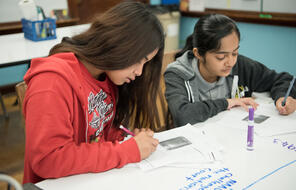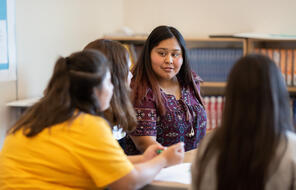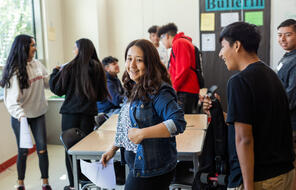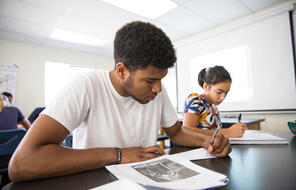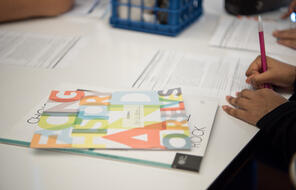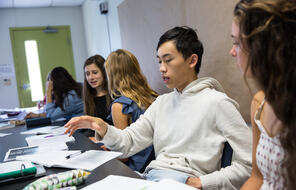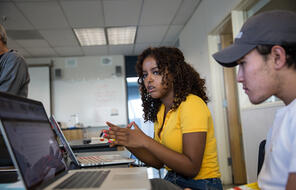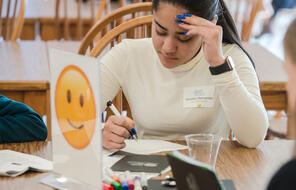As You Were
At a Glance
Subject
- English & Language Arts
- Culture & Identity
Access the Full Reading
Note: The original version of “As You Were” is not divided into two parts. We have designed the reading to be taught over the course of two class periods, with students focusing on the first half of the story in the first lesson and then the story as a whole in the second lesson.
Part 1 1
I love being under the lights. We all do. Being on the field, in a hyper-brightness that’s sharp against the dark autumn night, we feel electrified. We even like that it’s chilly, that there’s a little bite to the air that keeps other people away.
Football practice has been over for hours before we arrive; the stadium is ours. The whole world is, and we’re it.
A swath of hair is snatched from my lazy high knot by the same wind that immediately whips it around my face.
I don’t react. I don’t acknowledge that I was basically slapped in the face by hair so cold it feels like it’s made of something sharper. I just mark time.
Jessie lifts her hands to amplify and I know the next round of commands is coming.
“To the right flank! To the left flank! To the right' flank! To the right flank! Double to the rear!”
But she doesn’t say the magic word, and the losers I hear take off behind me are met with shouts and jeers. They’ll be the laughingstock for the next few seconds, just until they make it up to the stands and join the other disqualified band members. The chiding never lasts. Drill downs are how we unwind.
“As you were,” Jessie bellows, and I wipe my brain clean, alternating from the ball of my right foot to the ball of my left as I mark time in wait.
The disqualified among the drumline are tapping out a metronome, but every so often a snare adds a ridiculous string of flourishes designed to energize everyone on the sidelines and maybe throw a few of us competitors off our game. We only compete against each other in this sacred space, alone beneath the lights, when we’re pushing each other to be better. Because in the end, in the next field show competition or the next parade, it’ll show. When it really counts, we’ll win — or we won’t — as one.
That’s why I don’t smile, even when Jessie accompanies the drumline by busting out pieces of her Mace Drum Major routine. Even when I wanna whoop and holler with the others because she placed first in our division last weekend, and she is a beast with that stick.
There’s no inspection to pass during a drill down, but when I’m on, I’m on. My bandmates deserve that. So eyes forward, arms slightly bent, palms against my hips, middle fingers on the seam of my jeans. From the waist up, you can barely tell my feet are moving.
Jessie lifts her mace and the chatter dies down.
Here we go.
“To the rear, to the rear, to the right flank!” Double to the rear, to the ri — “To the left flank! High mark time!” She doesn’t make us wait this time. “Hut!”
Step, pivot, step, pivot, step, turn, step, turn, and this is the part she’ll drag out. Now we’re marking time again, only instead of lifting our heels off the ground, we have to lift each foot knee-high. And keep time. Which, after three years of marching band, isn’t a big deal. Unless for some reason I had to do it for two full minutes, after a longer-than-normal night of field show practice.
Jessie doesn’t call out rest, so we keep going. A few people must be getting lazy because she stabs the air in their direction and they fall out.
I low-key hate high mark time. It’s never a command given briefly. And it’s really not hard, it just seems to double in intensity very quickly.
I almost lose my balance, and as though Jessie’s rooting for me, she gives the halt command.
“Dress center dress!”
Arms up, one hand closed around a fist like we’re holding our instruments at attention. Our heads snap to one side, depending on where we are in relation to the fifty-yard line. And that’s how we find out there’s only two of us left.
We’re face-to-face.
Jessie definitely did this on purpose. The part she could do, anyway. I’m a marching star, but I would’ve been out if she hadn’t given the halt command, and this little head-to-head match wouldn’t have been possible.
“It’s down to Ebony and Josiah, the pride of the brass, trombone versus trumpet, the ultimate face-off.”
Our bandmates whistle and swoon because there are no secrets in marching band, and they all know Josiah and I have been circling each other since summer band camp. I’m immediately hot, despite the night, despite the wind, despite that I’m not wearing a jacket or gloves. But we’re still at dress, and I can’t look away — not that I want to look away. I just don’t want to be the center of attention while Josiah’s adorable, wind-rouged face is staring back at me.
Get it together, Ebbie.
“Atten-HUT!”
We snap our heads front, simultaneously bringing our hands down and back to our sides, chins slightly up.
I am going to win.
For my girls. For my section. For my pride. I am going to beat him and then I’m going to ask him to Homecoming.
Jessie tips her chin, almost too slightly to notice. It’s not a cheat. I have no idea what she’ll say. It just means she’s rooting for me. She loves her little brother, but she was in my section before she was promoted last year, and let’s just say that trumps blood. I mean, we’ve got matching shirts for god’s sake.
Trombonists Do It in Seven Positions.
And don’t you forget it.
“Mark time!”
The drumline starts up again.
“Backward. March!”
As Josiah and I take off toward the back of the field, eyes and bodies still facing our company, the trumpet section surprises everybody. The school fight song blasts into the open night air, and the rest of the band shrieks and rushes to grab their instruments.
“Slide right,” Jessie shouts into the bullhorn. “March!”
Torso front, I twist the bottom half of my body and march toward the home goalposts I can’t see.
My trombones are up now, and at first they’re pretty terrible. Cold brass doesn’t sound so hot. It doesn’t matter; they’re doing it to cheer me on, waving their bells and slides high, and side to side.
At Jessie’s command, Josiah and I march forward, to the rear, and then mark time.
We halt.
We resume, straight from attention, no marking first.
We halt again.
“About-face!”
Right toe behind my left foot, and spin.
“About-face!”
And I’m facing the back of the field again. “About-face!”
I hate Jessie sometimes.
Between her command, and the band members who abandon the second run-through of the fight song to yell it immediately after her, Josiah and I are spinning like tops.
Even when their laughter becomes contagious, and I can’t keep a straight face, and the flute section has inexplicably started playing some super-old-school Taylor Swift song, I keep going. The lights and the empty stands and the brass bells and the friends swirling through my vision.
And then the commands stop, but it’s so loud I don’t hear what to do next. I legit cannot see anything, my sides are hurting from laughing, and I’m still at attention.
“Ebbie, you won!” Jessie and the rest of the trom- bones are right there, one of them shaking me by the shoulders.
Josiah’s on the ground nearby.
“Did you fall?” I ask with what little breath I have left.
He makes a face and takes his head in his hands.
“Drill down champ!” Jessie shouts, holding one of my hands high. “Homecoming edition!”
“We’ll get you a sash to wear next Friday,” someone offers.
I did it. And no one can tell I’m on the verge of yarfing on the field.
“Good job, runner-up,” I say to Josiah when I offer him my hand, wondering for a moment whether he waited there for me. His section-mates joined him on the ground instead of helping him up, but I wouldn’t put it past any of them to be in on it too. This is marching band.
I don’t know how cold I am until I’m touching him. He takes my extended hand but keeps his elbow slack so that when he rocks back and hops to his feet, it’s on his own strength.
He’s just holding my hand.
My ice brick of a hand is slowly warming against Josiah’s, and we’re all walking back to the stands to collect our backpacks and jackets and instruments. My tongue may as well be a brick too, because now that I’m crowned drill down champ, and we’ll all be dispersing, disappearing into the night or mingling in the parking lot while the adrenaline wears off, I don’t know what to say. If there was a perfect moment to ask Josiah to the dance, the way I just assumed there would be, I missed it. Now we’re at the stands and he’s leading me to my stuff before our hands have to separate so he can gather his own.
It turns out I’m not as smooth as I thought.
“Be right back,” he says, squeezing my hand before letting go. He does that shy smile I love — the one that tells me I’d really better woman up if I want this to go anywhere — and heads toward his trumpet case.
Come. On. Do better, Ebbie.
And then as usual, Jessie saves the day.
“Ebony, I’ve gotta take a bunch of kids home,” she says, letting her shoulder crash into mine while she slides into her letterman. “Can you do me a favor and give Jo a lift? I’m probably gonna be all night.”
“All night? Really?” I’m nodding at friends as they wave goodbye while keeping an eyebrow cocked for Jessie. She’s my drum major, but she’s also my friend, and she’s also my crush’s sister who keeps badgering me to “hurry it up” putting the moves on him. Which is only slightly weird.
We’ve had plenty of opportunities this year alone, as far as she’s concerned. Two away competitions since the school year began, which means two bus rides — and marching band travel is hookup heaven. Long road trips on a charter bus with mood lighting and one adult who never seems to make it all the way to the back. And then there’s the competition itself. Sure we’re changing in front of each other too quickly to care what anyone looks like under their clothes, and then we’re rehears- ing the music in a tight coil around Jessie, and then we’re competing on the field, and then we’re marching in front of the judges while the drumline blows every- one away. But between the time we leave the field until the award ceremony starts?
Hook. Up. Heaven.
I mean. If you’re so inclined.
Back on the bus or stealing around the hosting campus or at the top of the stands, behind the lights, in the shadows. I don’t know how spectators and parents aren’t just constantly stumbling onto kids making out. It really wouldn’t be hard.
But Josiah and I haven’t even kissed, and not for lack of me daydreaming about it. Even sometimes while warming up. We’re both brass players, with precision embouchure control. (It’s all in the mouth muscles, right?)
Now Jessie’s getting impatient. Everyone is. We’re getting routinely ditched together, no one’s leaving room for us at the table when we stop for dinner on the way home from a performance. The people demand action.
“Josiah,” I call without answering Jessie, and when he looks up while slinging his backpack over one shoulder, I feel like my eyes bulge out of my sockets, heart-shaped.
“You’re riding with me.”
“Cool.”
“Cool,” Jessie echoes her brother, and then tips her forehead close to me. “Take your time.”
“Shut up,” I hiss, trying to quiet the butterflies careening through my stomach.
- 1From Take the Mic: Fictional Stories of Everyday Resistance by Bethany C. Morrow. Text copyright © 2019 by Bethany C. Morrow. Used by permission of Scholastic Inc.
Part 2
I wish I had a cool car. I mean, I wish I had my own car, period.
“Sorry I don’t have anything good,” I say to Josiah while I run through my mom’s preset radio stations as though there’s even a slim chance of stumbling on something at all acceptable.
“It’s okay, really. Whatever you usually listen to.”
“I usually don’t.” When I catch his glance in my peripheral vision, I clarify. “I don’t usually listen to the radio or CDs in the car. I try to run through the trombone part on the way to and from school.”
“What, in your head?”
I can’t tell if he’s making fun of me.
“Yeah. Or like, I’ll hum it.”
He’s smiling.
“From start to finish,” I continue, smiling too. “It’s really embarrassing.”
“Why’s it embarrassing?”
“Because I don’t notice how hard I’m nodding until I get to like a stop sign and early morning commuters are super unamused.”
“You’re keeping time, though, I get it,” he says through a laugh, lying full against the headrest like we carpool all the time, and we’re totally comfortable together. “They’re just not band geeks.” He shrugs. “Their loss.”
“Right?” I keep trying to settle my smile, but every time I glance over, he does too, and it starts back up.
For a moment, it’s just comfortably quiet. All I hear is the soft purr of my mom’s car while we idle at a stoplight. But we’re almost to his place and I haven’t popped the question. One more light, then a right turn at the gas station, and a couple residential blocks after that.
I should’ve driven more slowly. Or suggested we stop and grab a bite to eat. Something to give us a little more time together before the night ends.
I don’t want it to be over.
I don’t want to go home and fall asleep and have to start all over getting close to him tomorrow.
I’m about to do it. I’m about to ask Josiah if he wants to get drive-thru — the Homecoming proposal will just naturally flow out of that, I tell myself — and then there are lights in my rearview.
Red and blue.
I’m cold all over again.
“I think those are for me,” I say, and even I can’t hear how scared I am.
“Are you sure?” Josiah asks, twisting in the passenger seat to gawk out the back windshield like all he feels is general curiosity. We weren’t going very fast.”
Was I going too slow?
Did I forget to use my blinker? But I haven’t changed lanes in forever.
Did I swerve when I glanced at Josiah?
Have I looked over too many times?
My hands are at nine and three, white-knuckle tight around the steering wheel.
The gas station is coming up, and I wonder if I’m allowed to pull into the parking lot. I don’t know what to do. I don’t know what to say to Josiah. I keep almost forgetting he’s beside me and then freaking out that he is.
Behind me, the police cruiser lets out a weird brrp- brrp, like someone’s warming up a brass mouthpiece. Like I don’t know it’s following me even though I’ve dramatically reduced my speed.
“Everything’s okay,” I say to Josiah, but I’m biting my lip. He doesn’t respond, but I say it one more time as I pull under the gas station canopy.
The cruiser pulls in behind me and we park by the station where you buy air for your tires.
“Turn off your engine.”
The command blares out over an intercom and my heart jumps three feet.
Oh God. Please please please.
I turn the key in the ignition.
Everything’s okay. Be calm. Be polite. Be calm.
Josiah puts his hand on mine, and I remember again that he’s there.
I want to tell him we shouldn’t move too much but I don’t. I don’t want him to know how afraid I am. I don’t want him to know why this would scare me. I want to go back in time, rewind all the way back to the stadium, to the lights, to the field. I don’t want to be Ebony, an anonymous Black girl in her mom’s car, joyriding in the middle of a school night; I want to be Ebony, drill down champ, first chair trombone, section leader. I want to be with my bandmates, surrounded. Safe.
But Josiah’s here. His hand is squeezing mine, and he’s totally calm.
Maybe it’s a good thing. Maybe I won’t be a hashtag.
Maybe no one will have to remind people to say my name.
Maybe it’s a good thing there’s a white kid in the car with me. I can’t remember a single story of a Black woman or man or kid being shot when they had a white passenger.
Maybe this is like a band inspection. We pass or fail together.
My hand’s sweating and Josiah must have noticed by now, but I don’t let go until the officer makes it to my window and motions for me to put it down.
I fumble for a moment, let go of Josiah in case I need to get the registration from the glove compartment, remember I haven’t lowered the window yet, and reach over to do it before remembering I could’ve used my left hand.
The officer knocks on my window again, just as it starts to glide down. The night air gets in.
“Good evening, miss.”
“Hi,” I blurt. I want to point to my passenger and make sure the officer sees that he’s there, that I’m not alone. I don’t have my phone out, I’m not livestreaming the way I swore I would be if I ever got pulled over or detained or confronted by the liaison officer at our school, but I’m not alone. Josiah’s with me, so nothing bad can happen.
But this is real life. This is happening to me, the way it was never supposed to.
Nothing’s happening. You’re gonna get a ticket and Mom’ll take her keys for a little while.
Nothing is happening.
So why can’t I breathe?
Because he’s standing next to me. His crisp blue uniform is filling up my window; it’s all I can see, even though I’m still facing my steering wheel.
Slide right.
“Do you know why I pulled you over?”
Dress left.
My head snaps to face him, so I can say no. I don’t know why this is happening — but he doesn’t tell me.
“License and registration. Proof of insurance.”
My fingers refuse not to fumble, but I deliver what he’s asking for and then cradle my hands in my lap.
“Where are you going?”
I dress left again, feel my mouth gape before the words fall free.
“We had practice,” I blurt. “Marching band.”
“Marching band practice,” he repeats while he shuffles through my documents. “At night? What do you play?”
“It’s when the football field is free,” I say, but I don’t know if that’s true. I didn't invent band practice; nobody conferred with me before making the schedule. I shake my head to keep it clear. “Trombone. I play trombone; my friend plays trumpet.”
“Seems late.” The officer hands back my things. Maybe this is almost over. Maybe I’m anxious over nothing, and silly for being afraid.
Sandra Bland.
I jolt in my seat.
As you were.
As you were. As you were.
“Homecoming’s next weekend,” I say, and my voice croaks around the lump in my throat. I wish I could see my mother, and then the desire itself makes me want to cry. “Our director added a new closer.”
“Closer.”
“The last song in the field show. He added a new one. For halftime at the Homecoming game. We had to learn it.”
I glance over at Josiah for corroboration, but he just gives a little smile like I’m chatting with a friend while he patiently waits.
Dress —
“Well, Ebony, that doesn’t tell me where you’re going.” For a moment I don’t understand how the policeman knows my name. Or I don’t like that he does. It feels like he’s nearer now, but he isn’t. It feels like he’s larger, but he’s not. I just want to go.
“Home. I’m going home.”
He finally leans down to peer into the car.
“You two live together?”
“No, sir,” Josiah says through an easy laugh.
“A little young for that, I guess,” the cop replies, before standing.
I can breathe again.
“Step out of the car, Ebony.” He says it like it’s a question. But I can’t.
I can’t.
I’m at attention. My joints are locked, and I am solid rock.
He wants me to get out but I don’t know how to move. I don’t know how to make myself open the door, but I have to.
At rest.
“Ebony? Out of the car, please.”
And I find myself being grateful for his patience. I’m lucky he hasn’t taken my shakiness for resistance, that he hasn’t taken anything from his holster. I’ve seen videos of people being tased, the way they seize up and convulse. The way they look terrified and the way they go quiet even when they want to scream. I’ve seen the kind of bruises rubber bullets make, and the way a girl exactly my size is easily body-slammed, or wrestled to the ground when she’s dressed for a pool party.
He’s a good cop, I tell myself so I can open my car door without asking him why. He’s one of the good ones.
We’re still at the gas station, just beyond the canopy pouring harsh light over the rows of pumps and concrete.
The light is so different than on the field. The autumn air too. It isn’t crisp; it’s cutting.
There’s electricity, but it’s not the same.
There are no stands, but there’s an audience. People rubbernecking as they walk past us on their way to the shop, or pretending not to stare while they fill their tanks.
“Step this way, please,” the officer says, and for the first time I realize he has a partner. She’s standing on the passenger side of my mom’s car, next to Josiah — who’s still inside.
Good. I hope they let him be. I hope this doesn’t get any more embarrassing than it already is. I hope because of him, they let us go soon.
“Is something wrong?” I manage to ask the first cop when we’re a few steps away. I even try to smile.
“You seem really anxious, Ebony,” he tells me. “And part of my training as an officer is to recognize those cues.”
I feel stupid smiling and nodding, but I don’t know what else to do.
“So I’m gonna ask you to submit to a search of your person and your vehicle so that we’re satisfied you’re not hiding anything from us. If everything checks out, you can go on your way. How does that sound?”
Halt!
Halt!
“Mhm.” I nod enthusiastically.
The cutting breeze tightens the skin on my face in two distinct stripes, drying tears that must have streaked my cheeks without my noticing. If the officer sees them, he doesn’t say anything, and without him asking me to, I get down on my knees because that’s what remember a policeman saying someone should’ve done to avoid being manhandled or choked.
I hear gravel crunch under my jeans, but I don’t feel it. I’m losing senses, and I don’t know how to stop it. It isn’t safe. I have to know what’s going on, to pay attention, to hear the commands when they come so I don’t make a wrong move. But my brain is turning off. Not the way it does when the routine’s memorized and muscle memory will carry me through. It’s turning off the way it does when I’m listening to the news say a twelve-year-old shouldn’t have been playing in a park, as if that’s the reason the child is dead.
Atten-hut!
I am kneeling on the ground in the middle of the night, in a parking lot filling up with people if the now abundant footfalls are any indication, and I am near but not beneath the lights.
The football field is a million years ago. I can hear the music somewhere far away. My music, my trombone section, off in the distance. The alternate song we’ve had memorized since the middle of the summer, that we just put to steps tonight. The dramatic twelve counts the brass marches at half-tempo, while the high winds cover more ground, fanning out while we seem to move in slow motion. The way my heart swelled in my chest.
“Go ahead and lay flat,” the officer tells me, and I hear myself sob while hot tears slide. They slap the pavement next to me when I’m on my stomach.
Why is this happening? What did I do wrong?
Nothing. Everything’s okay.
But it can’t be, otherwise why am I on the ground? Hands pat my sides, starting at my rib cage, wrapping around to momentarily grip my front pockets before checking the ones at the back of my jeans. Two fingers slide into my back pocket and I know what they pull out.
My count sheet.
A small rectangle of paper, with five columns and a dozen rows.
Set.
Move.
Count.
Side to side.
Front to back.
Everything I need to know to find my position on the field, and how to get from one to the next. Everything I need to be part of a breathtaking portrait that comes to life when the music starts.
Almost everything.
I also need to see where the rest of my company stands. I need them on the field with me. I need to find my designated spot, and then adjust my position to fit neatly into the design we’re making together. That’s the only way to know I’m right.
That’s the beauty of marching band. The collective trumps everything, including the coordinates. We dress to each other, and then — then — I know where I am, and where I’m meant to be.
It’s still true, I tell myself. Josiah’s in the car.
I'm not alone.
Then the officer pats the inside of my legs. I gasp and he hesitates, because he felt it too. The cold wetness that bled through the denim when he pressed my jeans against my skin.
I don’t know when it happened, but at least I didn’t pee a lot.
It’s just a tiny bit.
I hadn’t even noticed, but now we both know....
There’s no command for this. There’s no way to wipe it clean. There’s no magic phrase that will undo all of this, or make it beautiful.
My shoulders go slack, and when I let my forehead rest against the pavement, my breath leaves in a long, low moan. The timbre is flat, like an instrument out of tune.
I wish none of this had happened, and I wish it was done.
The officer helps me to my feet, and when I look at him, I’m crying all over again. But he looks changed too. He’s not stoic or certain now, and I’m not imagining it. I know because his hand’s still on my elbow but it’s keeping me upright.
Maybe all I had to do was piss myself to save my life.
To turn a grip into a cradle. Maybe all the Black girls I’ve seen brutalized on camera and then blamed for their own abuse just didn’t make themselves pathetic enough.
I’m champ twice in the same, awful night.
But the electricity’s still there, behind me. There’s something nipping in the air. The policeman’s lips part but he doesn’t speak. I’ll have to turn around and see for myself.

Except instead of spelling out “trouble,” he’s drawn a treble clef.
Josiah.
He’s out of the car, holding a sign.
I KNEW YOU WERE TREBLE WHEN YOU WALKED IN ... He’s looking down at the poster board like he’s reading it along with me. Like he’s admiring all the musical symbols and all the glitter too. Like we’re passing notes in the hall and trying to make each other laugh with bad band puns.
But he’s not alone; everyone’s here.
Our bandmates. All the footfalls I heard when I was facedown on the concrete, with the smell of gasoline flooding my nostrils like there was an invisible oil spill — they were them. Because they knew all along. In my head, I hear the flutes play the song the way they did during the drill down.
Jessie’s beaming at me, and my heart sinks.
A dozen phones are pointed at me. They’re recording this.
Whatever this is.
“Ebony,” Josiah says. “Will you go to Homecoming with me?"
And then they’re cheering.
Josiah’s trumpet section has horns out again. They’re blasting pep band riffs into the night air, attracting even more attention in the lot of the too-bright gas station — but it sounds off. Like those charmless horns people blare at soccer games. It doesn’t sound right.
None of this is right.
“Surprise!” Jessie erupts, like maybe that’ll help me understand. She’s bouncing up and down, despite the camera she’s got trained on me. She’s contorting her mouth in a mock scream, pantomiming excitement and disbelief in the hopes that I’ll catch on. “It’s a promposal! Well, a Homecoming-posal!”
And they all laugh. Because this is a setup.
None of this was real. Except the damp spot in the crotch of my jeans....
I look left at the shamefaced police officer, then forward to see Josiah, whose smile is soft but excited.
Dress center.
There’s nothing to be afraid of.
It was all for Homecoming.
“This is why you wanted a ride,” I say, and it sounds so atonal, it could be a question or an accusation. “No, Jessie —"
It was all Josiah," she blurts, still beaming. "I was just following orders.”
“For once,” someone says, and everyone laughs.
The whole world laughs.
It’s funny because she’s our drum major. She gives orders; we take them. We’re her marching band.
I study the faces surrounding Josiah’s.
This is my marching band. This is my company.
You wanted to ask him to the dance, Ebbie.
This is what you wanted.
But the inside of my right pant leg is wet. The skin on both my knees is dimpled.
There’s chalky dust on my band shirt from lying on the ground, and probably on my forehead too.
“Ebbie.” Josiah says my name and my chin snaps up like I’ve been called to attention.
They’re all waiting.
This is the part where I get in line. Where I adjust my position. Where I dress right and left and center, so we’re all in sync. So we’re all in this together. So we’re one.
We pass or fail as a unit. “Ebbie?”
Dress center dress.
Only, something stops me. The same thing that makes my breath come fast and hard. That makes the police officer slowly take back his hand and shift his weight away.
Don’t make a scene. Don’t overreact.
But those commands aren’t from a drum major; they’re the ones I knew before marching band. Before high school. Before junior high. Maybe I’ve known them from birth.
Don’t get angry. Don't make them feel bad. Don’t cross your arms or ball your fists or grit your teeth.
They didn’t know.
“Eb?” Josiah’s smile is fading at last.
Dress center —
I reject this inspection. I break rank, allow myself to shake my head, to furrow my brow even though they’re all so happy. I keep my eyes trained on Josiah so that he’s the first to know.
This is not okay.
“No,” I say.
It goes very quiet. The band and the little crowd that’s joined us all stop. Now I can hear the cars passing on the street and the chime when someone goes into the gas station shop. Now it’s easier to tell we’re not on the field, or at a competition, and that here there are several sets of lights, and one of them is blue and red.
We’re not a company here; we can’t be. I’m the only one crying.
“No,” I say again, even though they’re still recording. Even though they heard me the first time. “I won’t go to Homecoming with you.”
When I move toward my mom’s car, I’m the only one who does.
“Why not?” Josiah asks, the sign still in both hands.
“Because,” I tell him, before I climb back in.
“You don’t know how horrible this is.
Maybe the wind picked up again and appled his cheeks, or maybe he did that on his own. Either way, Josiah’s brow is furrowed now, but he’s too many steps behind.
“As you were,” I tell him, and then the shamefaced officer opens my car door for me so that I can drive myself home.

